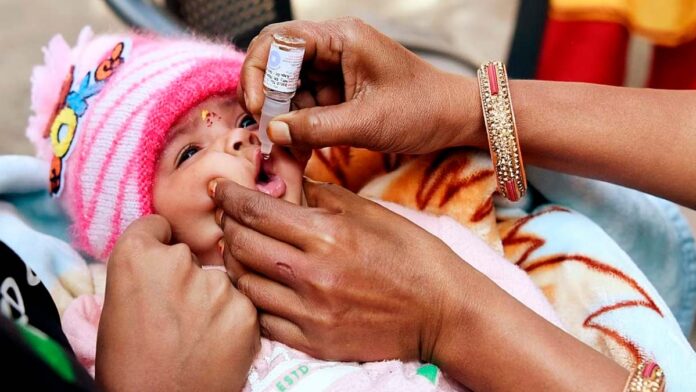In response to an alarming increase in polio cases, Pakistan has initiated a countrywide vaccination campaign aimed at protecting 45 million children. This marks the third nationwide campaign of the year to combat the disease, which remains endemic only in Pakistan and Afghanistan. The recent surge in cases threatens to undermine the country’s years-long fight to eliminate polio.
The vaccination campaign, launched on Monday, involves administering the polio vaccine to children under five and providing them with Vitamin A supplements to strengthen immunity. According to Ayesha Raza Farooq, the Prime Minister’s advisor for the polio eradication initiative, the drive will continue until Sunday, targeting all unvaccinated children.
“We are re-energized in our efforts to combat polio,” Farooq said in a statement, noting that renewed action is essential as cases continue to rise.
Prime Minister Shehbaz Sharif recently met with frontline health workers, urging them to ensure that every child is vaccinated through diligent door-to-door visits. Anwarul Haq, coordinator of the National Emergency Operations Centre for Polio Eradication, echoed this call, encouraging parents to fully support vaccination efforts.
“Polio has no cure, but it can be prevented with this readily available vaccine,” Haq stated.
Pakistan has recorded 41 polio cases across 71 districts so far this year, most of which emerged in Balochistan, Sindh, Khyber Pakhtunkhwa, and Punjab provinces. Previously, cases were primarily reported from the northwestern region bordering Afghanistan. However, a decision by Afghanistan’s Taliban-led government to halt door-to-door vaccinations in September has raised concerns about the disease’s cross-border spread, as people frequently travel between Pakistan and Afghanistan.
Afghanistan’s Ministry of Public Health has announced a three-day vaccination campaign targeting 6.2 million children across 16 provinces.
“It is worth mentioning that we do not have any positive confirmed cases of polio in 2024, and we are trying to prevent this virus through vaccination,” ministry spokesman Sharafat Zaman said.
However, logistical challenges remain, as the vaccinations are being administered in mosques and community centers known as hujras, rather than through door-to-door visits.
Afghanistan’s approach may limit vaccine accessibility for some mothers or female caregivers, as cultural restrictions prevent them from freely entering mosques or hujras. The World Health Organization (WHO) has been contacted regarding the implementation and potential impact of Afghanistan’s vaccination campaign, but no further details have been provided.
Violence against health workers and security personnel remains an ongoing threat during vaccination campaigns in Pakistan, where militants propagate misinformation, falsely claiming that polio vaccines are a Western ploy to sterilize children. Despite the challenges, Pakistan and Afghanistan’s health authorities are intensifying efforts to curb the spread of polio, underscoring the urgency of vaccinating every child in order to halt the disease’s transmission.


